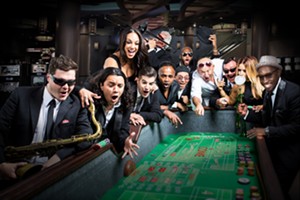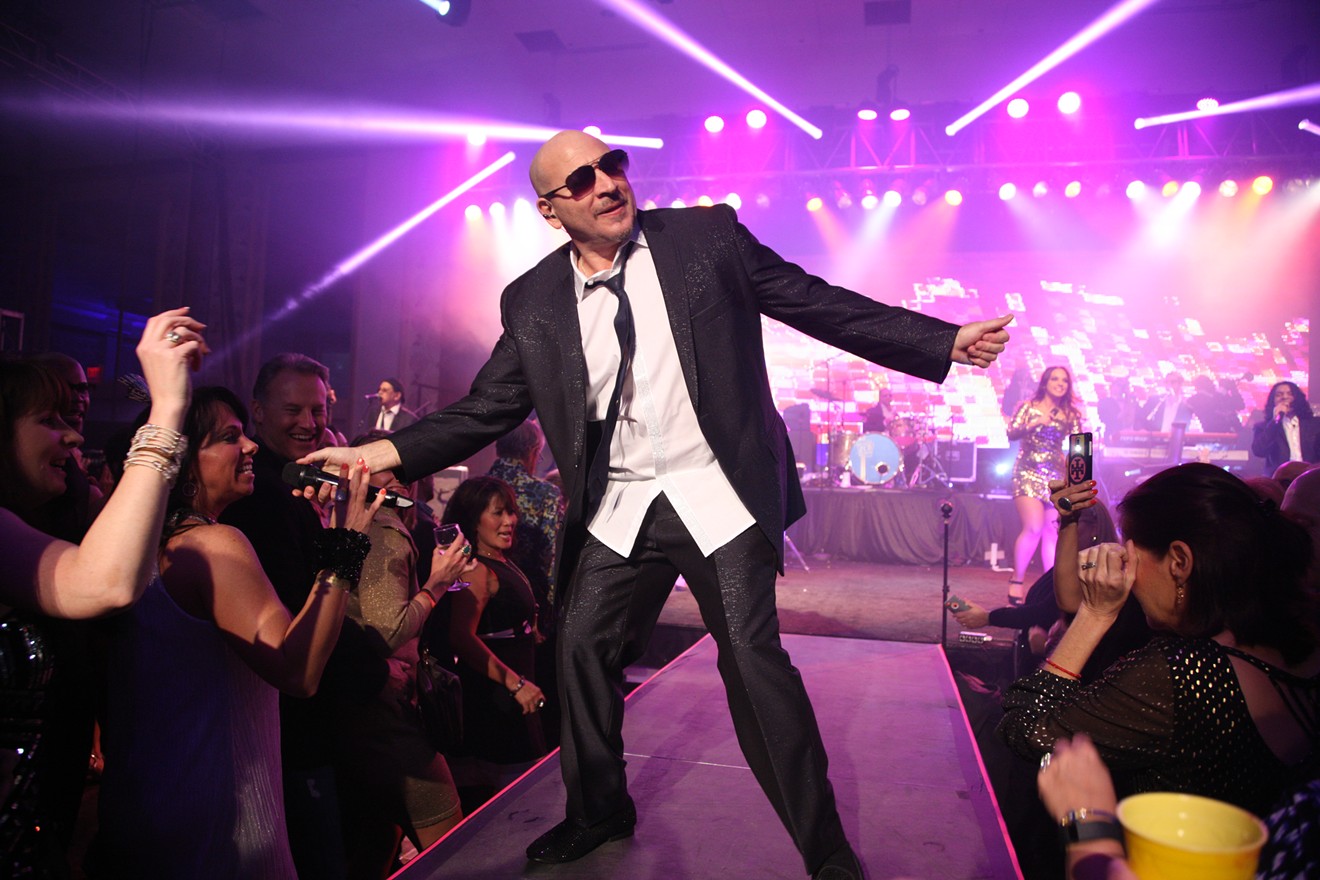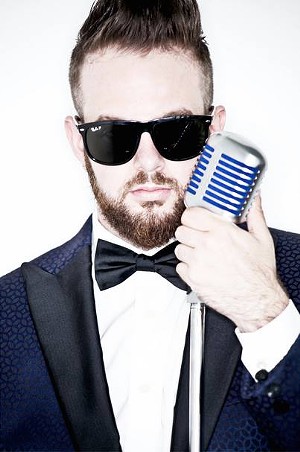He had rented the entire venue and drafted an elite guest list made up of local tastemakers, as well as wedding planners, venue owners and photographers whose business is high-end parties. Kahn's lavish party cost him $25,000. It was a novel approach to marketing, but the risk paid off. Within two months, the Jordan Kahn Orchestra earned a quarter of a million dollars.
Now, three years later, Kahn is a rising mogul in the party band business, almost on par with Deno Taglioli, leader of cover band Emerald City. Taglioli was once Kahn's mentor; today, they're bitter rivals.
Emerald City, formed in 1982, has become a Dallas institution. It's the most successful cover band in North Texas, playing 450 events in the last year alone. Owner Taglioli is a first-generation Italian immigrant who grew up in Detroit in the midst of the Motown explosion. He started the band after attending the University of Texas at Arlington on a scholarship. In an interview conducted via email, Taglioli said that "right off the bat, [Emerald City] had lines around the building."
While he couldn't recall how many band members have come and gone in Emerald City's three decades of business, he wrote that he's proud that some have gone on to perform for the likes of Peter Frampton and Prince. Taglioli also listed a large number of celebrities Emerald City has performed for — including, on two occasions, President George W. Bush at the White House.Jordan Kahn says that he and Emerald City bandleader Deno Taglioli worked amicably until he discovered that Taglioli had trademarked and registered his band's name without consulting him.
tweet this
Kahn was born in Ohio but was raised in Plano starting at age 3. After inheriting his great-grandfather's 1940s-era piano, he began to take music lessons, focusing on musical theater. At age 12, Kahn started deejaying parties.
He says that he donated all his profits that year, around $5,000, to the Make-a-Wish Foundation. Kahn says he regularly performs at charity events for free, with his company absorbing all the costs of performing, such as flights and hotels. He estimates these annual contributions amount to more than six figures.
Kahn grew up around the corner from Taglioli. He says that in 2005, during his senior year of high school, his father ran into Taglioli at the grocery store. Kahn's father asked the Emerald City frontman whether he would mentor his enthusiastic but inexperienced son before he left for college. Kahn had been accepted on a scholarship to the Berklee College of Music in Boston, where he pursued a dual major in vocal performance, and music production and engineering.
Taglioli accepted, and Kahn began repairing lights and studio equipment for Emerald City. Soon he was loading out gear from clubs at 5 a.m. before school started at 7:30.
"Everyone was like, 'What happened to you?' And I was like, 'I'm in a band,'" Kahn recalls, switching to a childlike voice.
Kahn describes his unpaid involvement with Emerald City as an unofficial internship that included handling sales calls and payroll. He says he continued working for Taglioli in an unpaid capacity intermittently throughout college. Taglioli sent him projects to work on remotely, and when Kahn was in town, Taglioli invited him to perform and sit in on operations meetings.
"We trusted each other; anything he asked me to do, I would deliver," Kahn says.
While in Boston, Kahn formed the band Downtown Fever with fellow students. Like Emerald City, it was a high-energy cover band playing hits from all the decades, and it did well.
"I had multiplied the band," Kahn says. "I had a New York, Boston and even Nashville band."
Kahn produced the bands and hired members as independent contractors. As Downtown Fever toured the Northeast, Kahn says, Taglioli proposed that he return to Dallas and merge the brand with Emerald City.
"He was impressed by the success of the business that I had created and said, 'I've being doing this for 30 years. Why don't we build on that instead of on your brand?'" Kahn recalls.
Kahn says he agreed, as long as he'd receive a substantial chunk of the business. "I said, 'I want 70/30 ownership,' and Deno agreed to that," Kahn says. "We shook hands on it, never put it in writing. I moved here and relied upon that handshake, basically."
Kahn was in charge of integrating the Downtown Fever brand, and he became Emerald City's director of operations and production. He says he was focused on growing business in Dallas and that he quadrupled it by creating three additional groups playing under different names, all produced by Emerald City.
"It was basically just me and Deno in that office," Kahn says. "Up until then, everything had been done in paper and pencil. I digitized his business." But Kahn says he never received the 30 percent equity that they'd agreed upon. "When a business was producing $4 million in revenue a year, it has a lot of profit," he says.
Kahn says that he and Taglioli worked amicably until he discovered that Taglioli had trademarked and registered the Downtown Fever name without consulting him. "Our intention was to memorialize all these things in writing, when I would have my shares, and then we would trademark the name to Emerald City LLC," he explains.
Kahn says he confronted Taglioli about trademarking the band to a business that he owned no part of. "He basically continued with: 'We'll get that done; it's a family; we'll take care of you,'" Kahn recalls.
After several meetings, Kahn says, Taglioli presented documents with increasingly lower offers. "Every contract that he put in front of me never had the equity as it should've been," Kahn says. "He was offering percentage share of profit at a much lower rate, and it also had provisions for him to fire me.""Jordan [Kahn] has his perspective on what happened and I have mine. ... I can put my head on the pillow at night and know I've done my best by everyone who has ever stood alongside me." – Deno Taglioli
tweet this
Kahn says he had no official legal counsel at the time. "This is my mentor. I trusted him. We'd done so much. I was kind of trapped at that point in time."
He turned in a letter of resignation after discovering about 10 websites for Downtown Fever registered to Emerald City, each an exact replica of the two that he owned. He says he presented Taglioli with a cease-and-desist letter, and Taglioli responded the following day with a lawsuit accusing Kahn of a variety of charges, including locking him out of social media accounts and not returning a $15 tablecloth. "He beat me to the courthouse, essentially," Kahn says.
Kahn countersued for the ownership of Downtown Fever. He says that after a year and a half of litigation and a weeklong jury trial, the presiding judge found the pair's oral contract to be binding and the trademark null and void. Court documents show that timeline to be correct and that both parties reached a settlement in spring 2016. The records are sealed, so the Observer is not able to independently verify the terms of the settlement.

"Jordan has his perspective on what happened and I have mine," Taglioli wrote to the Observer. "We've moved on and it's old news. I can put my head on the pillow at night and know I've done my best by everyone who has ever stood alongside me."
The House of Blues party was meant to re-introduce Kahn as an entertainer. His business partner, sound engineer Chris Stratten, who's worked with Nelly Furtado and Blues Traveler, says they'd decided to launch the business "quickly and aggressively, and market it as a luxury product."
Kahn has since added two bands, and each cultivates an air of mystery. None advertises or promotes on social media, relying instead on word of mouth among Dallas' elite. Stratten says profits have doubled each year and calculates that Kahn has a 20 percent market share of Dallas' luxury party band business. Emerald City is the only direct competitor.
"I'm surprised [Taglioli] hasn't come to us with a price to sell us Emerald City," Stratten says. "In 30 years, no one has had the strategy to go up against him."
Michelle Priest, an R&B singer and former Emerald City performer, says she worked as Taglioli's personal assistant for a year and a half about eight years ago. She was ecstatic at the opportunity to sing for Emerald City.
"In the beginning it was fun, but Deno was very underhanded, and he would pit the band members against each other," she says. "He thrived on chaos."
Priest believes she was underpaid for her work as a performer and in her administrative duties, noting a five-day business trip to Ireland for which she received only $200 for her time. She says she was "green" at the time and was grieving from the recent death of her teenage daughter. Later, she says, when she was given access to the office and became privy to Emerald City's profits, she realized how little the performers were being paid.
"You're caught up in the hype of it because of a little local celebrity status that comes with it," she says.
"Finally he said, 'Well, I have to tell you what was in [the package]. It was drugs.'" – Michelle Priest, former member of Emerald City
tweet this
Priest says the last straw was when Taglioli asked her to mail a package for him before a trip he was taking to Detroit with fellow band members. She says he instructed her to use her own return address. The package went missing, she says, and Taglioli called her repeatedly with worry.
"Finally he said, 'Well, I have to tell you what was in it. It was drugs,'" Priest says. "He thought it was intercepted. I told him, 'I'm a black woman, and you got me going into a federal place to mail this stuff. I could've gone to jail. Who would've believed me?"
Priest also says there was racial discrimination in the band, but Taglioli refutes her claims.
"I think her claims are ridiculous. Emerald City is a drug-free, diversity-based company, and our history speaks for itself," he wrote. "Our band cares more about your ability to hit the right notes and please our fans than the color of your skin."
Priest says that when she left the band to start her own project, Taglioli used intimidation tactics such as instructing band members to show up at her gigs. She also believes he attempted to blacklist her, stating that three venue owners called to warn her that Taglioli threatened to pull Emerald City out of their venues if they continued to book her band, but most didn't yield to those demands.
"Everyone knows it: Deno bullies his way to the top," Priest says. "If you're in a cover band, Deno will make it almost impossible for you to do it. He has connections like that. Deno is very charismatic, almost like a snake charmer. He could be a televangelist."
Donovan Marcelle joined Emerald City in July 2009 and was a lead singer for three years until another band offered to triple his pay. He says his new band leader "made me write down what I made and looked at it in complete shock. He said, 'Are you kidding me? You're in the biggest band in Dallas, and you get paid this little?'
"I was naive when it came to payment," Marcelle continues. He says that he made as little as $50 for a four-hour performance. "In my opinion, [Taglioli] took advantage of the good talent that he had."
Marcelle says his relationship with Taglioli became tense after an incident in which he couldn't hear himself onstage and accidentally stepped into Taglioli's spotlight.
"In the middle of the song, Deno said, 'What are you doing?' and I said, 'I'm just singing the backup part.' He said, 'Yeah, you're the backup, so back up,'" Marcelle recalls.
He says he put in his notice but agreed at Taglioli's request to stay on for a while. The day before a scheduled flight to Kansas City, Taglioli told Marcelle that he'd found a replacement and Marcelle wouldn't be performing at the gig. Marcelle says that as the ticket was under his name and had been paid for by the client, he transferred his flight to Los Angeles. Taglioli successfully sued him for the cost of the ticket and for $1,500 he'd put down toward Marcelle's car.
Pop singer Dezman Lehman, who goes by Dezi 5, replaced Marcelle after a friend urged him to audition in 2013. He performed with Emerald City for two years. Lehman says he was seduced by the opportunity to perform on a national platform; he got to open for acts such as Keith Urban and Gavin McGraw.

Lehman says that while Emerald City gets paid up to $50,000 for a gig, musicians only receive a few hundred dollars at best. "I started realizing that so much money was being made and I was being robbed," he says. "Except for the guys who are implanted in the band and have been around forever, the actual talent, singers, are getting the short end of the stick."
To an extent, Lehman agrees with Priest's view that Taglioli is racist. "He is definitely racist," Lehman says. "But he is an equal opportunity employer. If you're black and you're good, he'll hire you."
Lehman is still grateful for the opportunity to perform with Emerald City and has modeled his shows after the energetic party style he learned during his time with the band.
"Deno has a strategy, news teams on his side and a truck driving through Plano. Cougars have been following them forever," he says. "He has definitely built a great empire. Everybody's trying to be like Emerald City in Dallas. You have to know what you're getting yourself into when you join a cover band. I learned my lesson."
Lehman, who has since relocated to New York, says he also had difficulty following the instruction to perform at his best — but without outshining Taglioli, and he wouldn't consider rejoining the band. "I had a very dramatic exit," he says, laughing. "I couldn't come back."
Dwayne Heggar, Emerald City's bass player, has worked with the band since joining in December of 1989. He reports a different experience.Former Emerald City lead singer Dezman Lehman says Emerald City gets paid up to $50,000 for a gig, but musicians only receive a few hundred dollars at best. "I started realizing that so much money was being made and I was being robbed."
tweet this
"I've enjoyed every minute of it, and I'm still enjoying it," he says.
Heggar says there are many benefits to performing with the iconic Dallas band. Once, he says, a car salesman knocked $5,000 off the asking price for a vehicle after discovering that Heggar played in his favorite band. "We have a lot of high standards and rules; that's how we've been so successful," Heggar says.
Heggar, who is African-American, counters other band members' accusations of racial prejudice and unequal pay. He points out that Emerald City has performers of many races and says they are the highest paid in the city.
"There is no way [Taglioli] is prejudiced, not at all," he says. "I get tired of hearing of people making a mistake leaving the band and then trying to bash the guy."
Heggar praises Taglioli's "professionalism, vision and business mind" and says that his employer has bought cars for three members and occasionally paid others' rent. He also recalls a time when Taglioli put up the bail money for a singer who was jailed for unpaid traffic tickets.
"It hurts me so bad. He cares about these people," Heggar says. "He's not one to brag, but I can do that because I stand behind him."
Priest, who now provides entertainment for retirement communities, disagrees.
"Dwayne is so in denial and wants to protect Deno's image," she says. "It's really like brainwashing. They're so convincing that you have nowhere to go outside of Emerald City." She says that after she quit the band, Heggar told her, "You'll never work in this town again."
"Emerald City is really run like the mob," she says. "If you leave, none of them can associate with you."
In his email to the Observer, Taglioli included an open letter to his fans expressing how proud he is to be a part of Emerald City and help the "countless charities we perform at every year." He signed off with words to the readers: "I'd like to personally invite you to one of our upcoming events," he writes. "Come and see the truth. Your friend, Deno."













